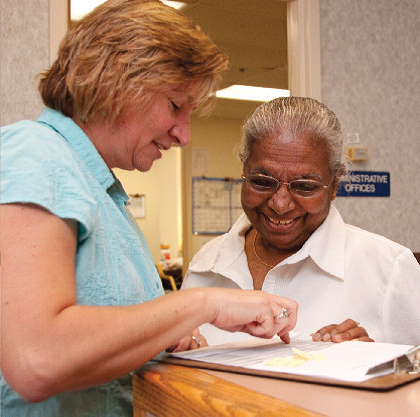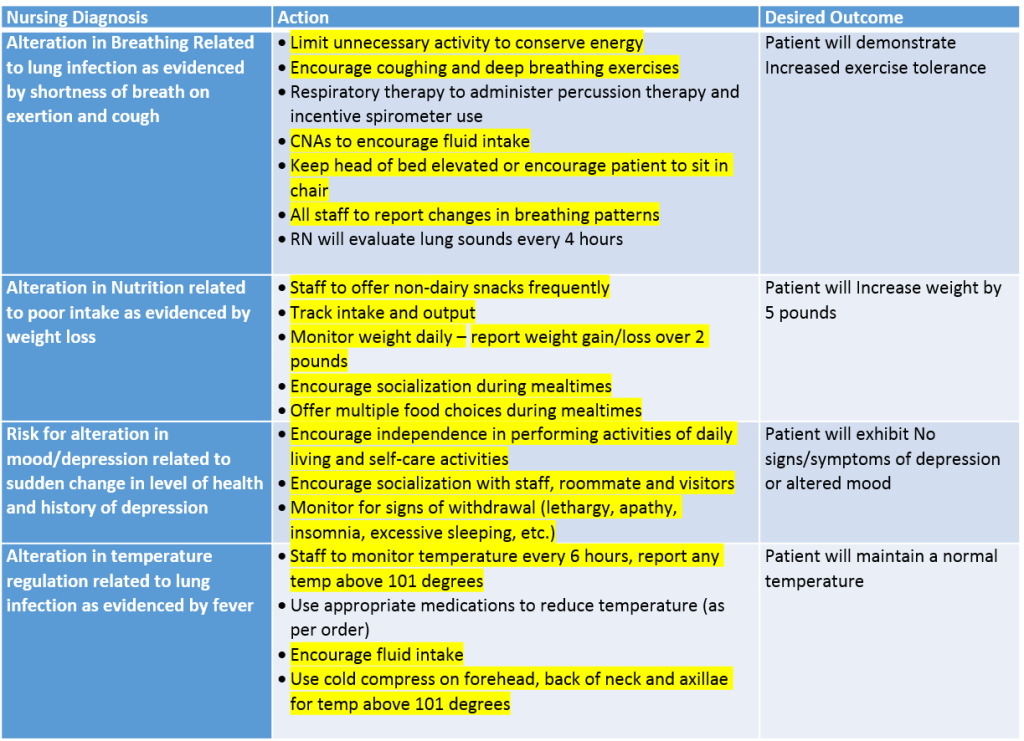What is a Care Plan and Why Should I Care?

“Every patient is different.” Sure, we all know that, but what does it really mean? More importantly, what does it mean to YOU, a certified nursing assistant? Well, quite simply, when you walk into a patient’s room, you need to know what to do. Care Plans provide specific instructions on what tasks healthcare team members (such as CNAs) should perform and HOW those tasks should be performed, based on the specific needs of the patient.
Let’s examine a scenario to help understand this process: You are assigned to care for Mr. Roberts in room 413. You walk into the room and Mr. Roberts is sitting in a chair by the bed, looking out the window. So, what skill do you start with? Do you grab a toothbrush and try to brush his teeth? Do you insist that he lie down in bed? Do you perform Range of Motion exercises? Do you give him a bedpan or can he go to the bathroom on his own? Confused yet?
With this particular patient, the answer is – none of the above. The patient (who is 24 years old) is able to brush his own teeth. He is able to sit in a chair (and in fact, is encouraged to do so). He does not need range of motion exercises. And no, you would not be giving him a bedpan. How awkward would he feel if you insisted on helping him brush his teeth? Or with his elimination needs?
So, what is it that you are REALLY supposed to be doing for this patient? That’s where the Care Plan comes in. A Registered Nurse (RN) will assess the patient and determine the proper course of action. The nurse will then write everything down so that all staff members are following the same set of instructions. This patient’s care plan might look something like this:
If you notice, all CNA-appropriate actions have been highlighted for you. So, for this particular patient, we will not be brushing teeth. But we will need to encourage fluids, offer snacks, monitor his weight and temperature, help him conserve energy, watch for signs of depression and other tasks as outlined by the care plan.
In short, your entire set of instructions for Mr. Roberts will be determined by the nurse. CNAs are not allowed to assess or determine what actions to take for any patient. You cannot direct the patient’s care because you don’t have enough information about that patient. CNAs simply follow the instructions provided by the nurse. Making decisions on your own is dangerous.
So what, you may ask? Let’s look at a CNA who doesn’t get the concept of care plans. Let’s call her Sandy. She treats all patients exactly the same, regardless of their diagnosis or care plan. She only performs the care SHE thinks is necessary. So, on this day, Sandy is assigned Mr. Roberts’ room. Sandy decides that since he has a lung infection, he should be lying down in bed, resting – so she tells him to get back in bed. She shuts the privacy curtain so he isn’t disturbed. When he doesn’t eat, she just assumes that’s normal and doesn’t let anyone know. She only checks his temperature when he feels warm. She offers some water when she thinks about it, but Mr. Roberts doesn’t like water and would prefer juice. She tells him that juice is full of sugar and not good for him – he should drink more water. This patient loses weight due to not eating (and the nurse is not aware of why his weight loss occurred), his lung infection worsens because he is lying down (and the nurse is not aware of why his infection has worsened), he begins to show signs of depression because his illness is interfering with work and family life (and the nurse is not aware of why he is withdrawing), he becomes dehydrated (the nurse is not aware of why he is dehydrated) and his fever is not treated appropriately (because the nurse is not aware that a fever even exists in this patient). Sandy’s treatment has not improved this patient’s condition. Even with the best of intentions, she has made poor decisions regarding Mr. Roberts’ care because she does not have enough information or education. Unfortunately, this patient’s condition has worsened considerably, resulting in a much longer (and more expensive) treatment and recovery.
So, Care Plans are essential in directing the care that the CNA should perform. CNAs are NEVER allowed to direct a patient’s care or make treatment decisions. Doing so can have serious consequences to the patient. CNAs are simply to follow the directions of the care plan and report all observations to the nurse. This keeps everyone on the same page and improve patient outcomes.
(3695)


September 7, 2014
Great info!